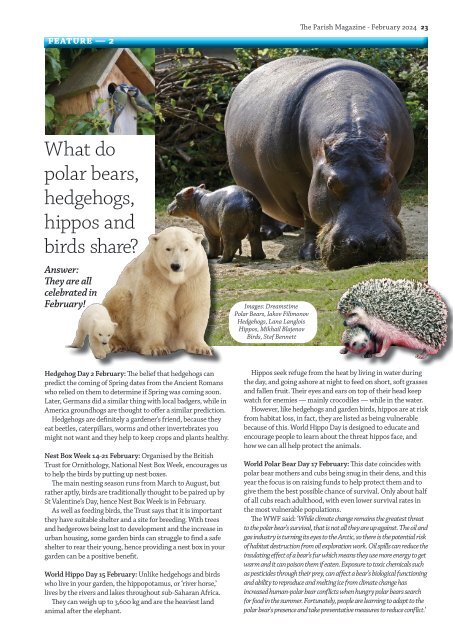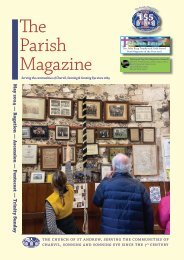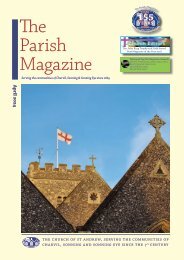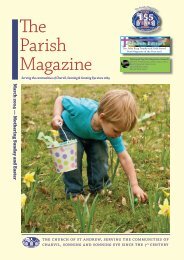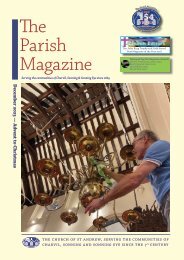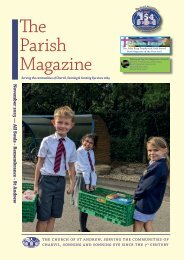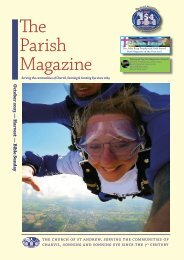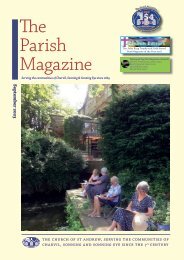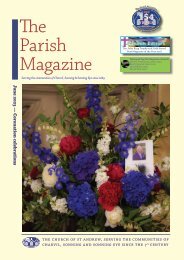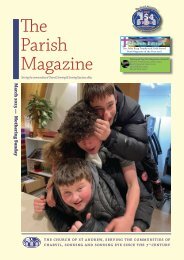The Parish Magazine February 2024
Serving the communities of Charvil, Sonning and Sonning Eye since 1869
Serving the communities of Charvil, Sonning and Sonning Eye since 1869
You also want an ePaper? Increase the reach of your titles
YUMPU automatically turns print PDFs into web optimized ePapers that Google loves.
feature — 2<br />
<strong>The</strong> <strong>Parish</strong> <strong>Magazine</strong> - <strong>February</strong> <strong>2024</strong> 23<br />
What do<br />
polar bears,<br />
hedgehogs,<br />
hippos and<br />
birds share?<br />
Answer:<br />
<strong>The</strong>y are all<br />
celebrated in<br />
<strong>February</strong>!<br />
Images: Dreamstime<br />
Polar Bears, Iakov Filimonov<br />
Hedgehogs, Lana Langlois<br />
Hippos, Mikhail Blajenov<br />
Birds, Stef Bennett<br />
Hedgehog Day 2 <strong>February</strong>: <strong>The</strong> belief that hedgehogs can<br />
predict the coming of Spring dates from the Ancient Romans<br />
who relied on them to determine if Spring was coming soon.<br />
Later, Germans did a similar thing with local badgers, while in<br />
America groundhogs are thought to offer a similar prediction.<br />
Hedgehogs are definitely a gardener's friend, because they<br />
eat beetles, caterpillars, worms and other invertebrates you<br />
might not want and they help to keep crops and plants healthy.<br />
Nest Box Week 14-21 <strong>February</strong>: Organised by the British<br />
Trust for Ornithology, National Nest Box Week, encourages us<br />
to help the birds by putting up nest boxes.<br />
<strong>The</strong> main nesting season runs from March to August, but<br />
rather aptly, birds are traditionally thought to be paired up by<br />
St Valentine’s Day, hence Nest Box Week is in <strong>February</strong>.<br />
As well as feeding birds, the Trust says that it is important<br />
they have suitable shelter and a site for breeding. With trees<br />
and hedgerows being lost to development and the increase in<br />
urban housing, some garden birds can struggle to find a safe<br />
shelter to rear their young, hence providing a nest box in your<br />
garden can be a positive benefit.<br />
World Hippo Day 15 <strong>February</strong>: Unlike hedgehogs and birds<br />
who live in your garden, the hippopotamus, or ‘river horse,’<br />
lives by the rivers and lakes throughout sub-Saharan Africa.<br />
<strong>The</strong>y can weigh up to 3,600 kg and are the heaviest land<br />
animal after the elephant.<br />
Hippos seek refuge from the heat by living in water during<br />
the day, and going ashore at night to feed on short, soft grasses<br />
and fallen fruit. <strong>The</strong>ir eyes and ears on top of their head keep<br />
watch for enemies — mainly crocodiles — while in the water.<br />
However, like hedgehogs and garden birds, hippos are at risk<br />
from habitat loss, in fact, they are listed as being vulnerable<br />
because of this. World Hippo Day is designed to educate and<br />
encourage people to learn about the threat hippos face, and<br />
how we can all help protect the animals.<br />
World Polar Bear Day 17 <strong>February</strong>: This date coincides with<br />
polar bear mothers and cubs being snug in their dens, and this<br />
year the focus is on raising funds to help protect them and to<br />
give them the best possible chance of survival. Only about half<br />
of all cubs reach adulthood, with even lower survival rates in<br />
the most vulnerable populations.<br />
<strong>The</strong> WWF said: ‘While climate change remains the greatest threat<br />
to the polar bear’s survival, that is not all they are up against. <strong>The</strong> oil and<br />
gas industry is turning its eyes to the Arctic, so there is the potential risk<br />
of habitat destruction from oil exploration work. Oil spills can reduce the<br />
insulating effect of a bear’s fur which means they use more energy to get<br />
warm and it can poison them if eaten. Exposure to toxic chemicals such<br />
as pesticides through their prey, can affect a bear's biological functioning<br />
and ability to reproduce and melting ice from climate change has<br />
increased human-polar bear conflicts when hungry polar bears search<br />
for food in the summer. Fortunately, people are learning to adapt to the<br />
polar bear's presence and take preventative measures to reduce conflict.’


